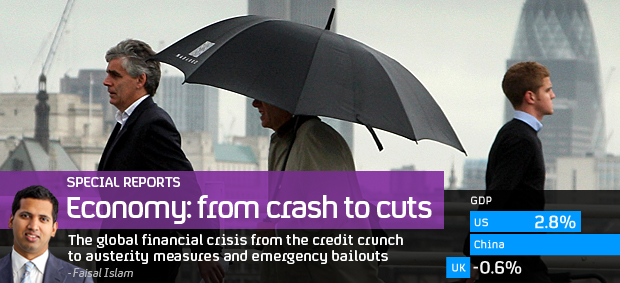Could taxpayers clean up the acts of the banks?
As a charity reveals state-owned RBS loaned money to a manufacturer of banned munitions, could Nick Clegg’s shares-for-all idea prevent this happening again? Channel 4 News investigates.

When the British Government stepped in to bail out Royal Bank of Scotland (RBS) and Lloyds at the height of the credit crunch in 2008, its actions were taken to prevent financial collapse.
But – campaigners argue – the Government also took on a moral responsibility to ensure that the part-taxpayer owned institutions invested in companies which were in line with its values. They have welcomed Nick Clegg’s proposal that shares in publicly owned banks Lloyds and RBS should be widely distributed to members of the public as a possible means to influence future investment behaviour.
One campaigner told Channel 4 News: “Perhaps the public will do what the Government has failed to do, and insist that RBS invests its money ethically and environmentally.”
RBS investments
Channel 4 News can reveal that in October 2010 RBS, along with a number of US banks, was part of a banking syndicate which secured a $1bn five-year credit facility to a company which – among other things – produces parts for banned cluster munitions.
To invest in cluster bombs is to invest in the misery they cause. IKV Pax Christi cluster munitions report
US defence company Alliant Techsystems is a major munitions and aerospace developer. Its products include parts for cluster bombs – a weapon of war which was banned under an international convention in 2008.
The United States did not sign the convention – but the United Kingdom did.
The deal was uncovered in a report by IKV Pax Christi, a Netherlands-based peace organisation, and Netwerk Vlaanderen from Belgium – members of the Cluster Munitions Coalition. It states: “To invest in cluster bombs is to invest in the misery they cause.”
A Royal Bank of Scotland spokesman told Channel 4 News its investments are in line with relevant international standards.
“RBS Group acts in accordance with the strict regulation and licensing arrangements set by the UK Government, and by relevant international standards, when engaging with companies involved in the design, manufacture, support and trade of defence equipment,” he said.
Read more: Give public shares in bailed-out banks, says Clegg
‘Wrong approach for a publicly-owned bank’
The World Development Movement has campaigned on similar issues, particularly regarding RBS’s links to what it believes are environmentally questionable companies under a “Clean the banks” banner.
It was part of a campaign group which took the Treasury to court in 2009 over RBS loans to controversial mining company Vedanta Resources.
Its head of Scottish campaigns Liz Murray told Channel 4 News: “RBS’s lending decisions are based to a very great extent on a company’s ability to repay – rather than with any thought given to what impact the activities of that company may be having on local communities or the environment.
“This is the wrong approach for what is essentially a publicly-owned bank, and needs to change.”
Government role in monitoring the banks
The Government believes its role is to ensure that UK taxpayers get best value from the investments in RBS and Lloyds, rather than to impose any top-down regulations – beyond those which apply to all banks – on which companies they finance.
UK Financial Investments, set up by the Treasury to oversee the public stakes in the banks, told Channel 4 News that investments and loans were an operational matter for the banks.
Perhaps the public will do what the Government has failed to do, and insist that RBS invests its money ethically and environmentally. Liz Murray, World Development Movement
Ministers agree that the Government cannot impose investment strategies. A letter from Business Secretary Vince Cable to the World Development Movement read: “UKFI manages the investments on a commercial basis and will not intervene in the day-to-day management decisions of the bank.”
But campaigners hope this “hands-off” approach could change if Nick Clegg’s plan, to give the public shares in the state-owned banks, goes ahead. This would see every British citizen holding shares in the banks – and thus, eligible to attend meetings and make their views known. This would mean the public could choose whether it wanted the banks to maximise value at all costs, or whether they would rather it had a more ethically-focused investment policy.
World Development Movement’s Liz Murray told Channel 4 News she believed the public could make the banks change.
“At the moment we have the worst of all worlds: British taxpayers’ money has funded the bail-out of RBS but we have no say at all in how the bank invests our money.
“Meanwhile, the Government has shirked its responsibilities as an active shareholder, allowing RBS to continue investing heavily in some of the dirtiest and most damaging fossil fuels in the world. Perhaps the public will do what the Government has failed to do, and insist that RBS invests its money ethically and environmentally.”
